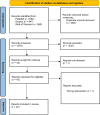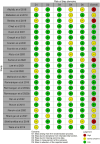High-flow nasal cannula use in pediatric patients for other indications than acute bronchiolitis-a scoping review of randomized controlled trials
- PMID: 37962672
- PMCID: PMC10912153
- DOI: 10.1007/s00431-023-05234-3
High-flow nasal cannula use in pediatric patients for other indications than acute bronchiolitis-a scoping review of randomized controlled trials
Abstract
The objective of the study is to summarize current literature on high-flow nasal cannula (HFNC) use for different indications in pediatric patient excluding acute bronchiolitis and neonatal care. The study design is a systematic scoping review. Pubmed, Scopus, and Web of Science databases were searched in February, 2023. All abstracts and full texts were screened by two independent reviewers. Randomized controlled trials focusing on HFNC use in pediatric patients (age < 18 years) were included. Studies focusing on acute bronchiolitis and neonatal respiratory conditions were excluded. Study quality was assessed by Cochrane risk of bias 2.0 tool. The main outcomes are patient groups and indications, key outcomes, and risk of bias. After screening 1276 abstracts, we included 22 full reports. Risk of bias was low in 11 and high in 5 studies. We identified three patient groups where HFNC has been studied: first, children requiring primary respiratory support for acute respiratory failure; second, perioperative use for either intraprocedural oxygenation or postoperative respiratory support; and third, post-extubation care in pediatric intensive care for other than postoperative patients. Clinical and laboratory parameters were assessed as key outcomes. None of the studies analyzed cost-effectiveness.Conclusion: This systematic scoping review provides an overview of current evidence for HFNC use in pediatric patients. Future studies should aim for better quality and include economic evaluation with cost-effectiveness analysis.Protocol registration: Protocol has been published https://osf.io/a3y46/ .
Keywords: Acute bronchiolitis; High-flow nasal cannula; Neonatal care; Pediatric patients.
© 2023. The Author(s).
Conflict of interest statement
The authors declare no competing interests.
Figures
References
Publication types
MeSH terms
LinkOut - more resources
Full Text Sources



